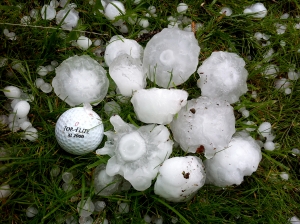How Hail Affects The Roofing Industry

The Good, the Bad, and the Ugly.
The good part of a hail storm is the increase in revenue to the roofing industry. Hail about the size of a golf ball can do a lot of damage to a roof and this damage is covered by your homeowner’s insurance. The homeowner pays their deductible and the insurance pays the rest.
A hail storm can sometimes create a large path of destruction for miles which in turns means a lot of roofs need replacing. Think of some of the subdivisions around you. What if just three or four of those neighborhoods overnight needed all new roofs? Hail damage creates a rapid increase in demand for products, labor, and services.
Every severe hail storm has a direct impact on revenue and job creation for the roofing industry. Shingle manufacturers will need to have their employees work additional shifts or overtime to keep up with production. Roofing suppliers will need to hire additional truck drivers or staff to keep up with the demand. Roofing companies overnight will be overloaded with calls and have a shortage of staff and laborers. Service providers like dumpster companies will need to hire drivers to keep up with the drop off and pickup schedules. The good part of hail is the job creation and the revenue it brings to the local economy.
The bad part of a hail storm is the increase in insurance premiums. Regardless if you file a claim or not your insurance premiums will go up in your area. Why? Insurance companies will be paying out millions of dollars and these losses have to be recouped. Insurance companies will spread out the losses and pass it along in increases of premiums. Therefore, if you are one of those people who think they won’t be affected because they didn’t turn in a claim, unfortunately you will feel the effect.
Here is the real ugly part of what happens to the roofing industry when a hail storm strikes. Think about these stats. At the end of 2008, Georgia had approximately 500 registered roofing contractors with the Secretary of State. At the end of 2009, that number went to 2,500 registered roofing contractors. Why the increase by 2,000?
Two reasons can be attributed to this surge. One, the crash of 2008 put numerous trades people from landscapers, graders, framers, painters, siding, builders, and general contractors out of business. Two, we had multiple years of large hail storms that struck the Atlanta metro area.
FACT: Georgia has absolutely no formal licensing or testing to enter the roofing industry. As a result, it was an easy and quick switch for many of the former trades people who thrived on new construction. Many registered with the Secretary of State and the local county for a business license. However, many did not.
Here is a quick checklist when considering a roofing company after a hail storm.
1) Stay away from those knocks at the door. These companies are usually desperate, under insured, and likely to go out of business in less than 5 years. They also could be storm chasers from out of state.
2) Go to the Georgia Secretary of State’s website and do a corporation search to see how long they have been in business. Make sure it states they are “ACTIVE/COMPLIANT” and not dissolved. Many companies falsely advertise their years in business and this is a quick way to see if you are dealing with a company of integrity.
3) Google their address. Make sure you are dealing with a real business and not a Mailbox Etc address. If their address is a P.O. Box than be on alert. You want to be able to visit their office should you ever have a future warranty issue.
4) Request a certificate of insurance and their insurance agents contact information. Call their agent and verify they have valid General Liability coverage and Workers Compensation. Request to be added as a certificate holder to the policy. This means you will receive an alert should they cancel the policy. Most roofing companies have 3 or fewer employees and do not have Workers Compensation. If someone is injured on the job, you as the homeowner would be responsible.
5) Check reviews online like Kudzu.com, Angie’s List.com, and Yelp. However, review sites can be tricky as some contractors create reviews for themselves or post negative ones to competitors.


